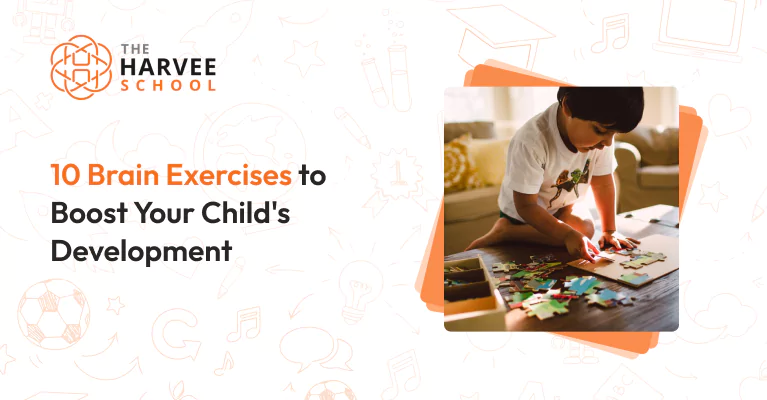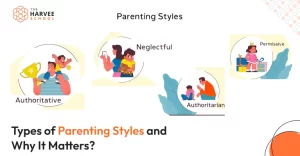10 Brain Exercises to Boost Your Child’s Development
Children learn through us. As a mother, nurturing our children’s growth and stimulating their minds for healthy brain development is just as crucial as promoting physical health.
Major brain development occurs during preschool years. It serves as an opportune time for mothers to aid their children in brain development. With all the brain-stimulating activities available, assist your child with these engaging brain exercises to help them achieve the next milestone.
In this article, we’ll explore ten effective brain exercises designed to engage and develop your child’s brain.
Importance of Brain Exercises for Children
As we have discussed, the early years are critical for brain development, with experiences and activities shaping neural connections that form the foundation for learning and behavior. Regular engagement in brain exercises helps improve concentration, memory retention, and overall cognitive function, setting the stage for academic success and lifelong learning.
10 Fun & Engaging Brain Workouts For Kids
Puzzles and Problem-Solving Activities
Puzzles, such as jigsaw puzzles and Sudoku, are fantastic for stimulating problem-solving skills and critical thinking in children. Encourage them to tackle puzzles that are age-appropriate yet challenging enough to provoke thought and perseverance. These activities not only sharpen their logical reasoning but also boost their confidence as they successfully solve problems. Additionally, building block toys can be included as they improve hand-eye coordination and dexterity.
Memory Games and Mnemonics
Memory games, such as card matching and ‘under the cups,’ are excellent for enhancing concentration and recall. Introduce mnemonics—fun memory aids—for remembering information or sequences. Encourage your child to create their own mnemonics, making learning personalized and enjoyable. This will help them learn advanced techniques to memorize lessons as they progress to higher grades.
Creative Arts and Crafts
Engaging in arts and crafts activities stimulates creativity and fine motor skills. Provide your child with materials for drawing, painting, sculpting, or crafting projects to allow them to express themselves freely. Children naturally enjoy exploring and learning. Participating in creative endeavors like this not only boosts brain development but also promotes imagination and problem-solving through experimentation and innovation.
Physical Activities and Coordination Games
Physical exercise isn’t just beneficial for the body—it also enhances brain function. Activities such as dancing, playing catch, or navigating obstacle courses improve coordination, spatial awareness, and cognitive flexibility. These exercises promote healthy brain development while encouraging active lifestyles in children. Allowing kids to engage in fun-filled outdoor activities gives them an opportunity to expend their energy and socialize with friends.
Reading, Storytelling, and Language Development
Talk to your kids. Communicating with them creates a sense of involvement, and they learn by imitating your actions. Reading aloud, storytelling, and discussing stories with your child enrich language skills and expand vocabulary. Encourage them to explore different genres and ask questions about characters and plot. Language development through stories fosters empathy, comprehension, and communication skills.
Music and Rhythm Activities
Music engages multiple areas of children’s brains and enhances cognitive abilities such as pattern recognition, auditory processing, and language development through rhymes. Singing, dancing to music, or playing simple musical instruments encourages rhythm and coordination while stimulating creativity and emotional expression.
Rhymes, in particular, help children learn the rhythms and sounds of language, improving their phonological awareness and memory. These activities not only enrich children’s cognitive development but also creates a love for music and a sense of accomplishment.
Scientific Experiments and Exploration
Encourage children’s curiosity through simple scientific experiments and exploring nature. Conduct experiments using basic household items to explore scientific concepts such as gravity or chemical reactions. Outdoor exploration helps children develop observation skills, problem-solving abilities, and a deeper appreciation for the natural world.
Logic and Strategy Games
Logic and strategy games, such as board games, puzzles that require strategy, and games like chess or four in a row, are excellent for challenging children’s analytical thinking and decision-making skills. Engaging in these games teaches patience, the importance of planning ahead, and the ability to adapt strategies—skills that are essential foundations for both academic success and life accomplishments.
Cooking and Baking
Involving children in cooking and baking activities introduces them to math concepts, following instructions, and understanding cause-and-effect relationships. These hands-on experiences not only develop motor skills but also encourage creativity in modifying recipes and promote healthy eating habits. When you communicate with your kids about ingredients, quantities, and the cooking process, it helps them learn how to plan and execute tasks effectively.
Mindfulness and Relaxation Techniques
Teaching mindfulness and relaxation techniques, such as deep breathing or yoga, helps children manage stress, improve focus, and regulate emotions. Practicing mindfulness with your child enhances their self-awareness and empathy, nurturing emotional intelligence alongside cognitive development. Always end each session with relaxation time to reinforce the importance of rest, which enhances brain function.
Additional Tips for Implementing Brain Exercises
Embrace each opportunity to engage with your child, encouraging their natural curiosity and creativity as they grow and learn.
Consistency is Key: Incorporate brain exercises into daily routines dedicating 20-30 minutes to reinforce learning and skill development. Regular practice enhances retention and mastery of skills, ensuring continuous cognitive growth.
Encourage Exploration: Encourage your child to explore their interests through various activities. Create a structured calendar plan with designated session times to organize their schedule, allowing them to fully engage in and enjoy their chosen pursuits.
Celebrate Progress: Recognize and celebrate achievements, no matter how small, to boost motivation and confidence.
Stay Playful: Keep activities fun and engaging to maintain interest and enjoyment.
Conclusion
Incorporating these ten brain exercises into your child’s routine not only supports their cognitive development but also cultivates a love for learning and exploration. By providing diverse and stimulating activities, you’re laying a strong foundation for their future academic and personal success.
Remember, every child is unique, so adapt these exercises to suit their interests and developmental stage. By nurturing their cognitive abilities early on, you’re empowering them to navigate challenges, think critically, and embrace lifelong learning with enthusiasm.






